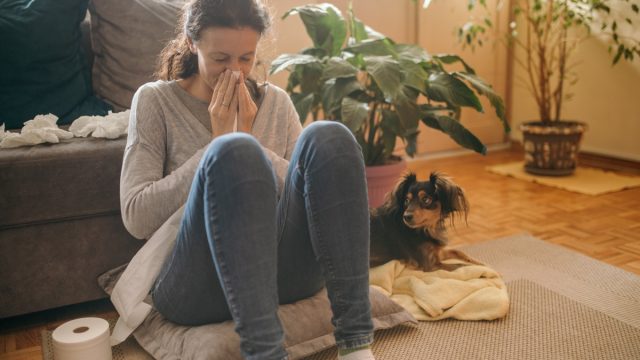“Important” New Study Shows How You’re Making Your Dog Sick

When you get sick, there are a few common ground rules that everyone follows. The most important? Staying hydrated and getting lots of sleep. If you’re contagious, you should also stay home from work, and cancel plans with friends to stop the spread of germs. For many of us, recuperating at home means spending extra quality time with our pets—but your sick day cuddles could be making your dog sick, a new study confirms.
RELATED: 8 Dog Breeds With the Worst Health Problems, Vet Tech Warns.
Health experts have long warned that pets aren’t exempt from catching human illnesses, and that it could be in your dog or cat’s best interest to take the same necessary precautions with them and keep your distance when you’re under the weather. As it turns out, the spread of human sickness to animals is even more common than we realized.
According to a recent paper in the Zoonoses: Infections Affecting Humans and Animals journal, “zoonosis” is any infectious disease that is passed between domestic animals to humans. The term isn’t one we hear often, but did you know that 60 percent of human pathogens are zoonoses?
And yes, infectious diseases can jump from humans to pets. This is called reverse zoonosis, and it happens by being in close contact with our pets. That contact can be kisses or cuddling in the same bed, but also simply eating in the same room.
Science suggests that diseases such as swine flu, human norovirus, COVID-19, tuberculosis, fungal infections, and parasites can be passed from owner to pet (and vice versa). The research shows that this can happen with dogs and cats, as well as other animals, including horses, ferrets, and even parrots.
“We’re starting to see a lot of examples of reverse zoonosis. Pets are more susceptible than, maybe, we previously thought,” study co-author Benjamin Anderson, PhD, an assistant professor at the University of Florida’s College of Public Health and Health Professions, told Phys.org.
RELATED: Fact Check: Is Purina Making Dogs and Cats Sick?
Because animals and humans are biologically different, diseases have to fight twice as hard to successfully enter the host’s cells.
“Typically, the viruses that I will have as a human are not going to fit into the receptors that a dog or cat has,” explained Anderson.
If those “specific cell receptors” aren’t there, the disease won’t be able to bind and, consequently, enter the animal’s cells. That’s when mutation occurs. When a pathogen mutates, it develops a new structure that allows it to bind and enter.
Health experts say that RNA has a higher mutating success rate than DNA, which is why there are so many different variants of viruses like the flu and COVID-19.
With reverse zoonoses on the rise, there is a real fear that diseases will be able to pass between humans and animals more frequently and mutate at an alarming rate. It creates a constant “back-and-forth” cycle that can then make the immune systems of owners and pets very vulnerable.
“While pathogens certainly can move from animals to other animals and can be picked up from the environment, exposure to humans also plays an important role,” Anderson said. “It’s this constant back-and-forth exchange that happens over time, increasing the probability of a mutation taking place that allows the pathogen to infect a new host.”
So, the next time you’re feeling a little under the weather, it might be best to refrain from quarantining with your pet—for their immediate wellbeing, and in the long-term, for your own.